Yiu, Lichia; Saner, Raymond : (2006-2007), “ WITKIN’S COGNITIVE STYLES AND FIELD THEORY APPLIED TO THE STUDY OF GLOBAL MANAGERS AND OD PRACTIONERS”
There has been an upsurge of publications based on Hermann Witkin’s ground breaking work on cognitive styles and human perception differentiated into field dependent and field independent styles (Winerman, 2006, Nisbett et all, 2005, Nisbett, 2003). This paper builds on current and past research of Witkin et al., and applies his concepts to the study of global managers and OD practitioners. The goal is to describe core aspects of culture related challenges which global mangers and OD practitioners have to overcome, and ends with proposing future research on possibilities of training global managers and OD practitioners in order to develop Integrated Perceptual-Cognitive Ability (IPCA). Such an IPCA competence would allow them to master both field-dependent and field-independent perceptual-cognitive skills.
Raymond Saner and Lichia Yiu, 2017, Matlin S. & Kickbusch, I. (eds.) “Pathways to Global Health: Case Studies in Global Health Diplomacy (Volume 2)”, Global Health Diplomacy, vol. 5, p.171-210.
The goal of this chapter is to describe and analyse the multi-stakeholder negotiation process which unfolded during the negotiation of the World Health Organization’s (WHO) Framework Convention on Tobacco (FCTC), including the influencing and negotiation behaviour of the different stakeholder groups and how their disputes resulted in the completion of the FCTC, the initiation of negotiations and agreement on a protocol for FCTC Article 15 (the illicit trade in tobacco products), and the unfinished negotiations towards a protocol for FCTC Article 13 (tobacco advertising, promotion, and sponsorship).
Saner, R.;“Organisational Consulting- What a Gestalt Approach Can learn from Off-Off-Broadway Theater”. Gestalt Review, Vol.3(1): 6-21, 1999.
Saner, R., Strehl, F., Yiu, L.; “La Formation Continue Comme un Instrument Pour Le Changement Dans L’Administration Publique“. (English and French). International Institute of Administrative Sciences, 1997.
Saner, R., Yiu, L.;"European and Asian Resistance to the Use of the American Case Method in Management Training: Possible Cultural and Systematic Incongruencies". The International Journal of Human Resource Management, 5 (4): 953-976, 1994.
Raymond Saner organised a panel on « Autonomy and Control : Basic Issues for Public Enterprises in a Competitive Environment » during the annual conference of the International Institute of Administrative Sciences (IIAS) in Vienna in 1992. Delegates presented cases showing how their public enterprises face the competitive pressures in their respective economy be this from private sector or other public sector enterprises. 18 delegates came from 15 countries and two delegates from international organisations (ILO, ARADO) presented their case analyses and subsequently engaged in lively discussions. This article served as a background paper for the subsequent presentations and discussions.
Raymond Saner and Lichia Yiu, (2014) “Learning to Grow: A Human Capital-focused Development Strategy, with Lessons from Singapore”.The authors argue that a key challenge for middle-income countries is to avoid ‘the middle-income trap’. In this situation, economic growth has come to a halt and a country is unable to transition to the next level in part due to inadequacies in high-level human capital. Taking the example of Singapore as a country that has avoided the middle-income trap, the authors call for ‘a much closer alignment of policies for human capital and economic development’ and a ‘human capital focussed development strategy’.(2014). This paper including a response by S. Gopinathan and others is also available at: http://poldev.revues.org/1803; to be cited as: Raymond Saner and Lichia Yiu, “Learning to Grow: A Human Capital-focused Development Strategy, with Lessons from Singapore, in “Policy Debate | Learning to Grow Beyond the Middle-Income Trap - Singapore as an Export Model?” by Raymond Saner, Lichia Yiu and S. Gopinathan, International Development Policy, Graduate Institute, Nr. 1803, University of Geneva
Studying cross-border regions requires an interdisciplinary approach consisting of among others micro-economics (competitive firm behaviour, local labour markets), spatial economics (rural and urban planning and architecture), policy analysis (regulatory function of government), urban geography (migration patterns), institutional sociology (administrative culture), social psychology (social cohesion) and cultural anthropology (comparative religion and values).
Scholars from different academic disciplines have studied conflict and negotiations over the past centuries going back to ancient times2. This holds not only for Western societies but for the world at large. Whether highly developed with codified norms and written rules or nomadic and based on narrative culture, societies tried to make sense of conflict and attempted to develop conflict resolution methods.
Global Economic Governance from the Perspective of a "Small State" - Economic Diplomacy of Switzerland
Published by the Economic Diplomacy Programme, SAIIA, Occasional Paper, No 124, November 2012.
Accessible at Website
This annotated bibliography covers those publications analyzing the link between Culture and International Negotiations. A special focus on WTO and Trade-related Negotiations was adopted while doing the literature selection.
A total of 32 publications available from the public domain were selected. They comprise books, articles in specialized journals and electronic sources. Publications selected and annotated are relevant for researchers interested in conducting further studies on Culture and International Negotiations as well as Culture and Multilateral Trade Negotiations.
NEGOTIATIONS: Contributions by Scholars from Social and
Economic Sciences, Raymond Saner, 2010, Diplomacy Dialogue, CSEND
 Education is a central priority for the State of Santa Catarina. Its policy makers are firmly committed to providing a relevant and efficient education system that responds to the requirements of the global economy and allows the state to be competitive, both nationally and internationally.
Education is a central priority for the State of Santa Catarina. Its policy makers are firmly committed to providing a relevant and efficient education system that responds to the requirements of the global economy and allows the state to be competitive, both nationally and internationally.
This OECD review gives a brief overview of education in Santa Catarina and its development. It presents an analysis of the system from pre-school to tertiary education and lifelong learning, and identifies key directions for policy reform in light of the challenges encountered by officials, communities, enterprises, educators, parents and students. It concludes with a set of key recommendations concerning the structure of the system and its labour market relevance; access and equity; governance and management; research, development and innovation; internationalisation; and financing.
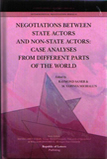 Today's world has gone beyond state-to-state negotiations. While these traditional forms of engagment still exist, the more rapid developments have occurred at the boundary of social and political conflicts. The State's strict jurisdiction over diplomacy as a tool for conflict resolution is being increasingly challenged by economic actors and civil society actors. This new overlapping of convergent and divergent interests between these multiple actors is the focus of the book.
Today's world has gone beyond state-to-state negotiations. While these traditional forms of engagment still exist, the more rapid developments have occurred at the boundary of social and political conflicts. The State's strict jurisdiction over diplomacy as a tool for conflict resolution is being increasingly challenged by economic actors and civil society actors. This new overlapping of convergent and divergent interests between these multiple actors is the focus of the book.
Research Report on Employee Turnover Survey in India. A joint study of Confederation of Indian Industries and Centre for Socio-Eco-Nomic Development. Lichia Yiu and Raymond Saner, 2008. Author: Saner, R., Yiu, L.
The International Monetary Fund's Influence on Trade Policies of Low-income Countries: A Valid Undertaking? (August 2007).
Author: Saner, R. & Guilherme, R.
Saner, R. "A challenge for international youth development: commitment and values -in search for universal love, friendship and understanding". International Youth Conference, Chinese Taipei, 1989.
![]() Staugard, F. (Ed.). The Role of Women in Health Development, The report of an international workshop held at the Nordic School of Public Health, 5-9 June, 1989.
Staugard, F. (Ed.). The Role of Women in Health Development, The report of an international workshop held at the Nordic School of Public Health, 5-9 June, 1989.
Author: Saner, R. & Yiu, L.
 This chapter provides an overview of the non-formal management education and in-service training and identifies various assessment tools used in Western Europe and Northern America. The chapter ends with an examination of options of safeguarding the value of non-formal management education and management development programmes in the spirit and context of life-long learning. Published in June 2009 in The Sage Handbook of Management Learning, Education and Development by Steven J Armstrong and Cynthia V Fukami. Author: Lichia Yiu, Raymond Saner
This chapter provides an overview of the non-formal management education and in-service training and identifies various assessment tools used in Western Europe and Northern America. The chapter ends with an examination of options of safeguarding the value of non-formal management education and management development programmes in the spirit and context of life-long learning. Published in June 2009 in The Sage Handbook of Management Learning, Education and Development by Steven J Armstrong and Cynthia V Fukami. Author: Lichia Yiu, Raymond Saner
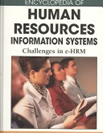 Human capital is seen as one of the key factor conditions contributing to national competitiveness and economic performance (Porter, 2002). Productivity performance of OECD countries tends to correspond to the skill levels of the workforce in specific countries. Hence, governments increasingly view human capital formation, both quantity and quality of workforce, as one of the key levers in ensuring sustained productivity gains and standard of living.
Human capital is seen as one of the key factor conditions contributing to national competitiveness and economic performance (Porter, 2002). Productivity performance of OECD countries tends to correspond to the skill levels of the workforce in specific countries. Hence, governments increasingly view human capital formation, both quantity and quality of workforce, as one of the key levers in ensuring sustained productivity gains and standard of living.
Author: Yiu, L., Saner, R.
Saner, Raymond, Yiu Lichia, “ Renforcer la corrélation entre formation et performance”, in Persorama, Nr. 4, 2006, pp. 44-46
![]() Saner, R. "The Need for Quality Assurance Systems of Training and Education in China to ensure Competitiveness and Sustainable Socio-Economic Development". Technoeconomics & Management Research 1. Beijing, 2005.
Saner, R. "The Need for Quality Assurance Systems of Training and Education in China to ensure Competitiveness and Sustainable Socio-Economic Development". Technoeconomics & Management Research 1. Beijing, 2005.
![]() This article delineates the link between high quality education and training and the filed of national competitiveness theory. In particular, the author's goal here is to develop the reasons why countries increasingly need well trained and motivated human resources.
This article delineates the link between high quality education and training and the filed of national competitiveness theory. In particular, the author's goal here is to develop the reasons why countries increasingly need well trained and motivated human resources.
An article published in "Technoeconomics & Management Research", Vol. 6 (2004 ) & Vol. 1 (2005) Beijing, Vol. 6 pp: 11-13 Vol.1 pp.11-14, Beijing.
Saner, R., & Yiu, L.,: ISO 10015: A Strategic Instrument in Human Capital Development, 2004.
In "Sound Governance: Policy and Administrative Innovations", 2004. Farazmand A. (ed.). Praeger.
Articles References
Article
This article includes several country reports on the use – or lack of it – made of ISO 10015, Quality management – Guidelines for training. It is not restricted to description alone, since the principal author argues against “ the party line ” which defends generic standards and advocates a sector-specific approach to training quality standards without which, he maintains, the customer may no longer shop at ISO.
Saner, R. "Quality Management in training , generic or sector specific?". (in German, French, Spanish), ISO Management Systems. Vol 2(4), 2002.
Brehm, K., Saner, R.;"Deutsches Stiefkind ISO 10015". Qualität und Zuverlässigkeit, 47 Jahrgang, Feb, 2002.
Saner, R., Yiu, L., Lévy, P.; "Riforma della pubblica amministrazione e qualita: l’esperienza della Svizzera". Azienda Pubblica, Vol. XII (5), 1999.
Yiu, L.; Cultural Variance of Reflection in Action Learning, August 2006 Attach article.
Saner, R. 2004. Diversity Management: eine kulturantropologische Perspektive. AGOGIK, 4: 25-31.
![]() Original title in German "Diversity management: eine kulturantropologische Perspektive". Agogik. Bern: April 2004. Author: Saner, R.
Original title in German "Diversity management: eine kulturantropologische Perspektive". Agogik. Bern: April 2004. Author: Saner, R.
Article
Environmental sustainability has emerged as an imperative issue in Northeast Asia demanding urgent attention at the national and international level. Rapid industrialisation in the region has resulted in large-scale pollution, resource depletion, and loss of bio-diversity.
Saner, R., Yiu, L., Yong J.; “Stakeholder Analysis of Trans-Border Regional Cooperation on Environmental Protection in Northeast Asia”. Social Strategies, Vol. 36, Weiss & Zanegger (editors), Peter Lang AG, Berne 2002
Author: Saner, R., Yiu, L., Yong J.
Yiu, L., Saner, R.; “Building Internal Capacities for Change in China: Action Learning in the Public and Private Sectors”. Action Learning worldwide- Experiences of leadership and organizational development .
Boshyk (Editor), pp. 293-310. Palgrave Macmillan, New York 2002.
Yiu, L., Parker, J., Saner, R.; “Best Practice: Tri-Continental (Europe, North-America, Asia) ODL Programme of 3M Corporation´s Asia-Pacific Research Laboratories”. The Lisbon 2000 European Conference “ODL Networking for Quality Training”, June, 2000.
Parker, J., Yiu, L.; “A Case Example of a Technology-Supported Laboratory Management Development Program”. Compedium on Uses of Distance Learning Technologies in Engineering Education”, 2nd Edition, January, 2000.
Saner, R., Yiu, L.; “Co-operation between Central/Eastern European Countries and Western Countries in the Field of Training and Consultancy for Administrative Reforms”. 24th International Congress of Administrative Sciences. International Institute of Administrative Sciences. Bruxelles, 1999.
Saner, R., Yiu, L.;"Coping with Labour Turnover in Taiwanese Companies, Province of China". American Asian Review, Vol. 11 (1), Spring 1993.
Saner, R., Yiu, L.;“Jing Li Chu Gao-Tsu Oh Quan Li Tse Sheng Tse Tao’t ("Exporting Managers Wining Strategies for Taiwanese (Taiwan, Province of China) Province of China Managers in Europe"). Management Magazine, Chinese Taipei, Vol. 184, October, 1989.
Saner, R., & Yiu, L. 1988. Technological Dependence from Foreign Countries is Dangerous Active Licence Strategy - A Pattern for Switzerland? The Japanese Journal of Strategic Management, 13 (1): 25 -27.
“How could change efforts be supported by Chaos and Complexity Theory?” Raymond Saner & Lichia Yiu, CSEND Geneva, 12th February 2001
Saner, R., Yiu, L.; “International Cooperation for Social Development: Practitioners’ Reports & Critical Reflections”. Final Report Geneva 2000 Forum- the Next Step in Social Development. Geneva. June, 2000.
Conference Proceedings on "Chaos Theory and the Arts in the Context of Social, Economic and Organisational Development. 18-21 March, 2000; Pari Center, Pari, Italy
![]() Please click here for Conference Invitation
Please click here for Conference Invitation
Please click here for Conference Details
Please click here to read the paper
Die Übergabefeiern vom 1. Juli 1997 sind bereits Geschichte, und die Hongkonger fragen sich ebenso wie die ganze Welt, ob die rasche Aufhebung der in der letzten Phase der Kolonialzeit erlassenen Gesetze durch die neuen Gesetzgeber bereits den Anfang vom Ende der Idee »ein Land − zwei Systeme« einläutet.
Yiu, L., Saner, R.; "Lessons Learnt from Implementing A Large System Development Project in China", presentation made at 1998 International Congress of Applied Psychology, San Francisco. CSEND Working Paper. 1998.
The goal of this article is to reflect on the impact which key donor organisations have had on Small and Medium sized Enterprise (SME) development projects in post communist Russia and to illustrate the difficulties of conducting SME development in Russia during a time when “Shock Therapy” was the dominant ideology at most of the Western donor agencies and organisations. An example is given below from a SME institution development project in Samara, Russia. The author thanks his Western and Russian colleagues for their insights and suggestions and hopes that this article will contribute to future policy discussion on SME policy and development at donor organisations.
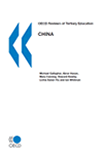 This Country Note offers independent, external observations of the tertiary education sector in the People’s Republic of China.1 It forms part of the OECD Thematic Review of Tertiary Education. The Thematic Review is designed to examine policy frameworks and settings for tertiary education across participating countries. The scope of the Review considers tertiary education in its broad economic and labour market context, as well as its linkages with the other sub sectors of education.
This Country Note offers independent, external observations of the tertiary education sector in the People’s Republic of China.1 It forms part of the OECD Thematic Review of Tertiary Education. The Thematic Review is designed to examine policy frameworks and settings for tertiary education across participating countries. The scope of the Review considers tertiary education in its broad economic and labour market context, as well as its linkages with the other sub sectors of education.
![]() Article
Article
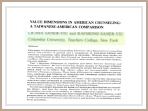 This paper is a discussion of prevailing American value dimensions in conseling theory and practice in general and a comparison of Taiwanese (Taiwan, Province of China) and American counselling value dimensions in particular.
This paper is a discussion of prevailing American value dimensions in conseling theory and practice in general and a comparison of Taiwanese (Taiwan, Province of China) and American counselling value dimensions in particular.
![]() As part of the work programme of the Geneva Trade and Development Unit, a comprehensive analysis was undertaken of the 29 Diagnostic Trade Integration Studies (DTIS) available as of October 2008 to assess whether and to what extent the DTISs provide concrete recommendations and actions which can support comprehensive strategies for promoting, upgrading, diversification and value addition in manufacturing and related industrial development activities associated with commodity production. Although DTISs were not designed as a commodity development tool, it is important to recognise that for most of the Least Developed Countries primary commodities including agricultural and mineral commodities are the main source of income, employment and trade. For many of these countries, their journey out of poverty is linked to the development of the commodity sector.
As part of the work programme of the Geneva Trade and Development Unit, a comprehensive analysis was undertaken of the 29 Diagnostic Trade Integration Studies (DTIS) available as of October 2008 to assess whether and to what extent the DTISs provide concrete recommendations and actions which can support comprehensive strategies for promoting, upgrading, diversification and value addition in manufacturing and related industrial development activities associated with commodity production. Although DTISs were not designed as a commodity development tool, it is important to recognise that for most of the Least Developed Countries primary commodities including agricultural and mineral commodities are the main source of income, employment and trade. For many of these countries, their journey out of poverty is linked to the development of the commodity sector.
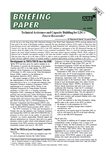 In the run up to the Hong Kong (HK) Ministerial Meeting of the World Trade Organisation (WTO), growing attention has been paid to the needs of developing countries, especially the least developed countries (LDCs) many of whom face depend persistent poverty and indebtedness. Judging from the draft Ministerial Text submitted by Chairman of the General Council (GC) and the Director-General (DG) to the WTO members in anticipation of the HK Ministerial Meeting, the concern about the plight of the LDCs seems to have increased considerably. There is a need for initiating measures to improve the trade related technical assistance (TRTA) and trade related capacity building (TRCB). While calling for improved aid is laudable and urgently needed, at the same time member countries should take a step back and reflect on what has been done so far in the name of TRTA in order to reach an agreement on TRTA at the HK Ministerial Meeting which will have sufficient chances of actually leading to sustained improvement of living conditions in the LDCs.
In the run up to the Hong Kong (HK) Ministerial Meeting of the World Trade Organisation (WTO), growing attention has been paid to the needs of developing countries, especially the least developed countries (LDCs) many of whom face depend persistent poverty and indebtedness. Judging from the draft Ministerial Text submitted by Chairman of the General Council (GC) and the Director-General (DG) to the WTO members in anticipation of the HK Ministerial Meeting, the concern about the plight of the LDCs seems to have increased considerably. There is a need for initiating measures to improve the trade related technical assistance (TRTA) and trade related capacity building (TRCB). While calling for improved aid is laudable and urgently needed, at the same time member countries should take a step back and reflect on what has been done so far in the name of TRTA in order to reach an agreement on TRTA at the HK Ministerial Meeting which will have sufficient chances of actually leading to sustained improvement of living conditions in the LDCs.
CSEND conducted research on how to best include employment and decent work into the Poverty Reduction Strategy Papers (PRSP), the successor instrument of the IMF/WB following their failed Structural Adjustment Programme (SAP). CSEND drafted a major document titled "Decent Work and Poverty Reduction Strategies: An ILO Advocacy Guidebook" and developed a 24 role negotiation simulation concerning PRSPs. The simulation was pilot-tested in Ethiopia (2003) and Cameroon (2005). The Guidebook was published by ILO, Geneva, April 2005.
Saner, R.; “O negociador experiente". Senac (Editors),
Sao Paulo, Brazil, 2002.
Saner, R.;“Zur Kultur eines Berufs: Was ist ein Diplomat?”. Auswärtiges
Amt- Diplomatie als Beruf, Brandt/Buck (Hrgs.), pp. 333-339. Leske & Budrich, Opladen 2002.
Saner, R.; “El Experto Negociador”. Paul Haupt Verlag (Editors), Los
Amigos del Libro, Bolivia, 2002.
Saner, R.; Yiu, L.; “External Stakeholder Impact on Third-Party Interventions in Resolving Malignant Conflicts: The Case of a Failed Third-Party Intervention in Cyprus”. International Negotiation, Vol. 6: 387-416, 2001.
Saner, R.; Becerra, M. (editors); "Trade Negotiations Cases, Analyses, Strategies at Bilateral, Regional and Multilateral Levels: Bolivia 2001", (English and Spanish), Los Amigos del Libro, La Paz, 2001
Saner, R.; Jauregui, S; Yiu, L; "Climate Change and Environmental Negotiations: Global and Local Dynamics"; Los Amigos del Libro, La Paz, 2001.
The objective of this paper is to focus on one aspect of European regional integration which has been given insufficient attention so far by scholars and policy analysts alike. In particular, the question which this articles attempts to answer is how to nurture the development of sustainable trans-border regional cooperation and trans-border integration. The large majority of existing regional studies focus on competitiveness of intra-national regions like Baden-Würtemberg (South-Western Germany) or Lombardy (Northern Italy).
Saner, R.; Maidana, I; "Trade Negotiation Case, Analyses, Strategies at
Bilateral, Regional and Multilateral Levels: Bolivia 2000", Los Amigos del Libro, La Paz, 2001.
Saner, R., Yiu, L., Sondergaard, M.; "Business Diplomacy Management: A Core Competency for Global Companies". Academy of Management Executive, Vol. 14 (1), February, 2000.
Wahl, U., Saner, R.; "Zur Verhandlungstechnik- Ueber Strategien und Taktiken". Index- Fachmagazine Betriebswirtschaft, Vol. 3, 1998.
Saner, R.; “Verhandlungstechnik”. (in German), Paul Haupt Verlag, Berne, 2008 (2. Auflage)
“Socio-Economic Foundations of a Just Society”, Special Report from the 1996 Conference of the Society for the Advancement of Socio-Economics, Centre for Socio-Eco-Nomic Development. Geneva. 1996.
Saner, R., Yiu, L.; “Conflict Handling Styles in Switzerland- Some Preliminary Findings & Initial Interpretations”. Die Unternehmung, Vol. 2, 1993.
Beyond the public's occasional glimpse of the work carried out by the International Committee of the Red Cross (ICRC) lies an untold story of human vulnerability that is largely unresearched. The informed public generally admires ICRC's 125-year history of caring for the war wounded, of protecting the lives of prisoners of war, and of providing relief to civilian populations affected by armed conflicts...
This articles describes the use of action learning and action research in the development of management training institutions and management development experts in China. A case study is reported here which was based on a technical cooperation project between Switzerland and China which took place from 1994 to 1996. The aim of this project was to build up the Chinese Government’s institutional capacity in support of its policy to modernise its public administration and to strengthen its management of public enterprises.
Saner, R., Yiu, L.; "Transnational Leadership: The Role of Field Dependence/Independence". Technical Reports HEC. No. 19. Geneva, October, 1994.

Les revendications envers un service public avec un fonctionnement davantage orienté sur l'action, l'efficacité et la réduction des coúts ne se sont pas apaisées au cours de ces dernières années.
Les modifications de l'environnement économique, les exigences accrues de la clientèle, la raréfaction des ressources, l'amélioration des connaissances et les nouvelles technologies constituent autant de nouvelles condition-cadres pour le service public ...
![]() Countries suffering from high transactions costs are often victims of administrative inefficiencies and policy ineffectiveness at central governmental level. The objective of this article is to describe such inefficiencies and ineffectiveness as they presented themselves after Slovenia reached independence from the former Yugoslavia in 1991. In particular, the author describes the multiple causes of inefficient administrative and ineffective policies as they presented themselves in the subsequent period of gradual administrative modernization during the years of 1993-1996.
Countries suffering from high transactions costs are often victims of administrative inefficiencies and policy ineffectiveness at central governmental level. The objective of this article is to describe such inefficiencies and ineffectiveness as they presented themselves after Slovenia reached independence from the former Yugoslavia in 1991. In particular, the author describes the multiple causes of inefficient administrative and ineffective policies as they presented themselves in the subsequent period of gradual administrative modernization during the years of 1993-1996.
Public administrations in all parts of the world are faced with multiple pressures to innovate and improve effectiveness and efficiency. Reforms range from New Public Administration (NPM) to other forms of reorganizations like ‘‘gestion publique par contrats’’ (France, Belgium) resulting in various forms of New Public Administrations (NPA).
Globalization exerts powerful pressures on our national government and public administrations. Most distinctive are the pressures regarding public management effectiveness and the internationalization of the civil service. The former demands that traditional public administrative culture be transformed into a managerial culture, the latter involves increasing alignment of national policies and relations with the private sector according to international standards and practices. Civil servants are pushed by these trends to expand the definition of their role and to acquire new knowledge and skills in order to meet this challenge of globalization.
Saner, R.;"Globalization and its impact on leadership qualification in public administration". International Review of Administrative Sciences, Vol. 67: 649-661, 2001.
![]() Article
Article
Qualifications: Reflections and Responses". Asian Journal of Public Administration, Vol. 22 (1), June, 2000.
The goal of this paper is to present the case example of China in its development effort of future leaders within the public sector. This case example will first describe the leadership
model currently in use in China as the basic framework of assessment, selection and development of leaders befitting the tasks requirements of the 21st century. Narrative description will be given regarding the actual practices regarding leadership assessment, selection and development in China.
Das Ziel dieses Artikels besteht darin darzulegen, wie die Action-Learning-and Action-Research-Methoden innerhalb eines New-Public-Management-Reform-Projektes eingesetzt werden konnen, and aufzuzeigen, wie dadurch der Transfer von New-Management-Know-how an die Kundenorganisation sichergestellt werden kann .
Saner, R., Yiu, L.; “Institutioneller Aufbauprozess der Zentralverwaltung Sloweniens Mittels Action Learning und Action Research“. Information Internationalen Treuhand AG, Nr. 103, Basel, April, 1998.
![]() Article
Article
“Compendium of Pilot Projects for Improving Working Procedures in the Slovene Public Administration"
Weiterbildung: Kommunikation, Information und Einbezug der Anspruchsgruppen in der schweizerischen Bundesverwaltung“, (Interface Management of In-Service Training of Switzerland’s Public Administration) (in German), Paul Haupt Verlag, Berne, 1997.
Partnership 1986-1996”. 3rd International Conference of the International Institute of Administrative Sciences Brussels on “New Challenges for Public Administrations in the Twenty-First Century” . Beijing. October, 1996.
Crevoisier, J.; "Interview avec M. Raymond Saner - Pour réinventer la Suisse, allons à Singapour". La Suisse est-elle soluble dans l’Europe. Journal de Genève, Gazette de Lausanne. George Editeur, 1996.
![]() Article
Article
Saner, R., Yiu, L.; “The Need to Mobilize Government Learning in the Republic of Slovenia”. The International Journal of Public Sector Management, Vol. 9 (5/6), 1996.
The transition from command economy to market economy, and from Soviet rule to parliamentary democracy, has turned out to be more problematic than had been anticipated by many western policy advisors. By applying Sachs "Shock-Therapy", many government officials of Central and Eastern European Republics (CEER) ...
Saner, R.,Yiu, L.; “Learning from the Asian NIC’s: Policy Options for Central & Eastern European Republics”. Advances in International Comparative Management, Vol. 9: 253-275. 1994.
![]() Article
Article
